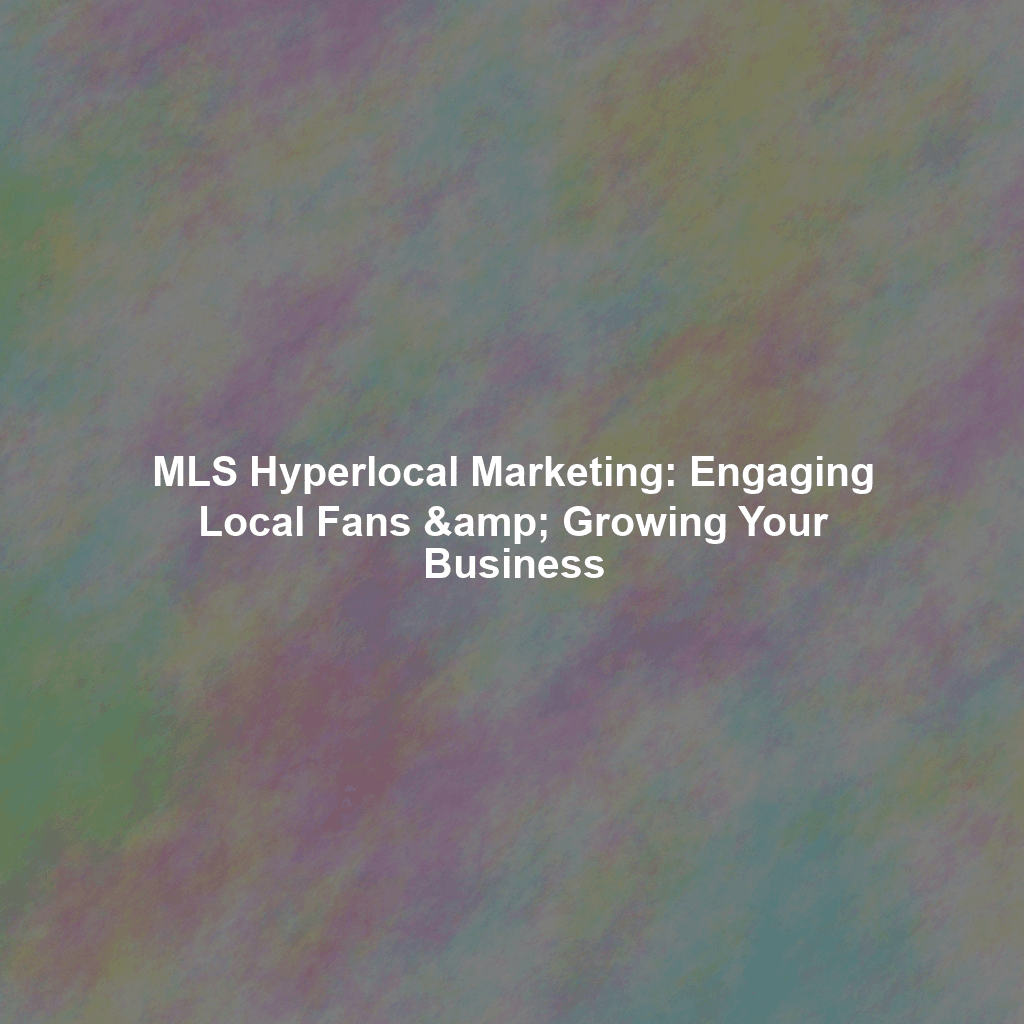Think of the Seattle Sounders and their ubiquitous “Emerald City Supporters,” or the Portland Timbers’ vibrant “Timber Army.” These aren’t just fans; they’re an integral part of the team’s identity and a powerful marketing force in their own right. Understanding how MLS teams achieve this level of engagement can unlock significant potential for your own business.
Why Hyperlocal Marketing Matters: Beyond National Reach
While national and even global marketing campaigns can generate broad awareness, hyperlocal marketing focuses on building meaningful relationships within a specific geographic area. This approach offers several key advantages:
- Increased Brand Loyalty: By actively participating in community events and initiatives, businesses demonstrate a genuine commitment to the local area, fostering trust and loyalty among residents.
- Improved Brand Recognition: Consistent local engagement increases brand visibility and recognition within the target community. People are more likely to choose a brand they see actively contributing to their neighborhood.
- Targeted Messaging: Hyperlocal marketing allows for highly targeted messaging that resonates with the specific interests and needs of the local population.
- Cost-Effectiveness: Focusing on a defined geographic area can often be more cost-effective than broader marketing campaigns, allowing for a better return on investment.
- Word-of-Mouth Marketing: Happy local customers are more likely to recommend your business to their friends, family, and neighbors, creating a powerful ripple effect of positive word-of-mouth marketing.
In essence, hyperlocal marketing is about becoming an integral part of the fabric of the community you serve. It’s about building relationships, fostering trust, and demonstrating a genuine commitment to the well-being of the local area.
MLS Hyperlocal Strategies: A Playbook for Success
MLS teams have mastered the art of hyperlocal marketing. Let’s break down their key strategies and how you can adapt them for your business.
Community Outreach Programs: Getting Involved in the Neighborhood
MLS teams understand that their success is directly tied to the health and well-being of their local communities. They invest heavily in community outreach programs that address local needs and create positive social impact. These programs often include:
- Youth Soccer Clinics: Offering free or low-cost soccer clinics for children and teenagers is a fantastic way to engage with families and promote the sport. This also helps build a future generation of fans.
- School Partnerships: Partnering with local schools to provide resources, mentorship programs, and educational opportunities is another effective strategy.
- Charitable Initiatives: Supporting local charities and non-profit organizations through fundraising events, donations, and volunteer efforts demonstrates a commitment to the community’s well-being. For example, many teams partner with organizations fighting homelessness or providing food assistance.
- Environmental Initiatives: Participating in local environmental initiatives, such as park cleanups and tree planting events, shows a commitment to sustainability and environmental stewardship.
Adapting this for Your Business: Identify the needs and interests of your local community and create programs that address them. For example, a local bakery could offer free baking workshops for kids, a hardware store could host DIY home repair seminars, or a landscaping company could participate in community garden projects. The key is to find ways to give back to the community and demonstrate your commitment to its well-being.
Example: D.C. United’s “United As One” platform focuses on community initiatives, including literacy programs and support for underserved youth. Learn more about D.C. United’s community efforts.
Strategic Partnerships with Local Businesses: A Win-Win Scenario
MLS teams frequently partner with local businesses to create mutually beneficial relationships. These partnerships can involve:
- Sponsorships: Local businesses can sponsor team events, games, or individual players, gaining valuable exposure to a large and engaged audience.
- Cross-Promotions: Teams and local businesses can collaborate on cross-promotional campaigns, offering discounts or special deals to each other’s customers.
- Co-Branded Products: Creating co-branded products, such as team-themed merchandise or limited-edition items, can generate excitement and drive sales for both the team and the local business.
- Community Events: Partnering to host community events, such as block parties or festivals, can attract a large crowd and create a positive brand association.
Adapting this for Your Business: Identify local businesses that share your values and target audience and explore opportunities for collaboration. A local restaurant could offer discounts to customers who show their team tickets, a brewery could create a special team-themed beer, or a clothing store could sell team merchandise. The key is to find partnerships that are mutually beneficial and create value for both businesses.
Example: Many MLS teams partner with local breweries to create signature beers sold at stadiums and local bars, enhancing the game-day experience and supporting local businesses.
Content Marketing that Resonates Locally: Telling the Community Story
MLS teams excel at creating content that resonates with their local fan base. This content often focuses on:
- Team History and Traditions: Sharing stories about the team’s history, traditions, and legendary players helps build a sense of pride and connection among fans.
- Local Player Spotlights: Highlighting the stories of local players who have risen through the ranks to play for the team can inspire fans and create a personal connection.
- Community Profiles: Featuring stories about local community members, organizations, and events helps showcase the team’s commitment to the local area.
- Behind-the-Scenes Content: Providing fans with behind-the-scenes access to the team, players, and coaches creates a sense of exclusivity and strengthens their connection to the club.
- Local Event Coverage: Covering local events, festivals, and community gatherings demonstrates the team’s involvement in the local area.
Adapting this for Your Business: Create content that tells the story of your business within the context of your local community. Highlight your employees, your customers, and your involvement in local events. Share stories about the history of your business and its connection to the local area. The key is to create content that is authentic, engaging, and relevant to your local audience.
Example: The Portland Timbers’ social media often highlights the passionate “Timber Army” fan base and their unique traditions, showcasing the team’s deep connection to the city’s culture.
Leveraging Social Media for Hyperlocal Engagement: Conversations that Connect
Social media provides a powerful platform for MLS teams to engage with their local fan base in real-time. Effective strategies include:
- Local Hashtags: Using local hashtags in social media posts increases visibility and allows fans to easily find content related to the team and the community.
- Location-Based Targeting: Utilizing location-based targeting to deliver targeted ads and content to fans within a specific geographic area.
- Interactive Contests and Giveaways: Running contests and giveaways that are relevant to the local community can generate excitement and increase engagement.
- Live Event Coverage: Providing live coverage of team events, games, and community gatherings on social media allows fans to stay connected and engaged.
- Responding to Local Inquiries: Actively monitoring social media for mentions of the team and responding to inquiries from local fans demonstrates a commitment to customer service and community engagement.
Adapting this for Your Business: Use social media to connect with your local customers and build relationships. Share local news and events, run contests and giveaways that are relevant to your community, and actively respond to inquiries from local customers. The key is to be present, engaged, and responsive on social media.
Example: Orlando City SC uses its social media channels to promote local events, highlight fan experiences, and share stories about the team’s community involvement, fostering a strong sense of local pride.
Personalization and Localization: Speaking the Local Language
MLS teams understand the importance of personalization and localization in their marketing efforts. This involves:
- Language Translation: Offering content and communications in the languages spoken by the local community.
- Cultural Sensitivity: Being mindful of local customs and traditions when creating marketing materials.
- Personalized Messaging: Tailoring messages to specific segments of the local population based on their interests, demographics, and preferences.
- Local Imagery and References: Using local imagery and references in marketing materials to create a sense of familiarity and connection.
- Supporting Local Causes: Aligning with local causes and initiatives that are important to the community.
Adapting this for Your Business: Tailor your marketing messages to resonate with your local audience. Use local imagery, references, and language in your advertisements and communications. Support local causes and initiatives that are important to your community. The key is to show that you understand and appreciate the unique characteristics of your local market.
Example: LA Galaxy often incorporates Spanish-language content and imagery into its marketing campaigns to connect with the large Hispanic population in Los Angeles.
Measuring Hyperlocal Success: Tracking the Impact of Your Efforts
Measuring the success of your hyperlocal marketing efforts is crucial for optimizing your strategy and demonstrating its value. Key metrics to track include:
- Website Traffic from Local Sources: Monitor website traffic from your local area to assess the effectiveness of your local marketing campaigns.
- Social Media Engagement from Local Followers: Track engagement metrics, such as likes, comments, and shares, from your local social media followers.
- Customer Acquisition from Local Markets: Measure the number of new customers acquired from your local target market.
- Brand Awareness within the Community: Conduct surveys or focus groups to assess brand awareness and perception within your local community.
- Sales Revenue from Local Customers: Track sales revenue generated from local customers to measure the direct impact of your hyperlocal marketing efforts.
- Foot Traffic: If applicable, measure foot traffic to your physical location after implementing a local marketing campaign.
Tools like Google Analytics and social media analytics dashboards can provide valuable insights into the performance of your hyperlocal marketing campaigns. By carefully tracking these metrics, you can identify what’s working well and make adjustments as needed to maximize your return on investment.
Reference: Explore Google Analytics documentation for tracking website traffic and user demographics: Google Analytics Help
Avoiding Common Pitfalls in Hyperlocal Marketing
While hyperlocal marketing offers significant benefits, it’s important to be aware of potential pitfalls and take steps to avoid them:
- Lack of Authenticity: Consumers can quickly spot inauthentic marketing efforts. Ensure your community engagement activities are genuine and reflect your company’s values.
- Ignoring Local Needs: Failing to understand the specific needs and interests of your local community can lead to ineffective marketing campaigns.
- Inconsistent Engagement: Sporadic or inconsistent engagement can undermine your credibility and damage your brand reputation.
- Overly Promotional Content: Focusing solely on self-promotion can alienate your audience. Balance promotional content with valuable information and community-focused stories.
- Ignoring Competition: Failing to monitor your competitors’ hyperlocal marketing efforts can put you at a disadvantage.
By being mindful of these potential pitfalls and taking a thoughtful, strategic approach, you can maximize the effectiveness of your hyperlocal marketing efforts.
Conclusion: Building a Lasting Local Legacy
Major League Soccer teams offer valuable lessons in building a hyperlocal brand. By actively engaging with their communities, partnering with local businesses, and creating content that resonates with regional identities, they have cultivated passionate fan bases and fostered a strong sense of local pride. By adapting these strategies for your own business, you can strengthen your local connections, build brand loyalty, and create a lasting legacy within your community. Remember to focus on authenticity, understand your local audience, and consistently engage with your community to achieve sustainable success. The power of local connection is undeniable, and by embracing hyperlocal marketing, you can unlock the full potential of your business.
 Skip to content
Skip to content

